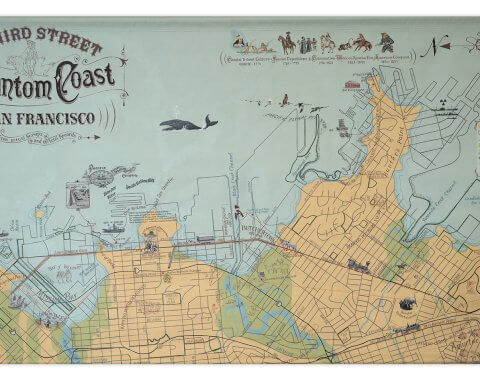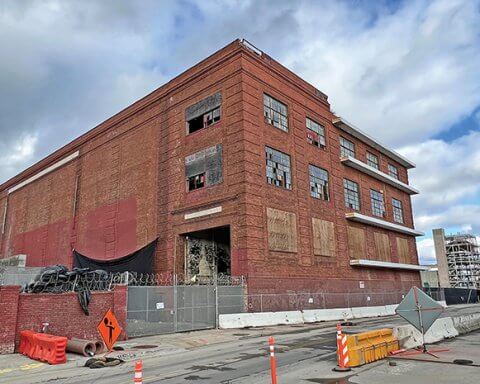In December, California College of the Arts’ unionized staff voted to authorize a strike, accusing the administration of unfair labor practices.
Jennie Smith-Camejo, of Service Employees International Union Local 1021, told the View that “as of now, there’s not a date set” for a labor action.
“Things are still kind of to be determined right now,” Smith-Camejo said. “Basically, they voted 97 percent to authorize a strike in December. The contract negotiating team will be issuing the call to strike. It’s pretty close to that point.”
According to Smith-Camejo, about 120 staff members are unionized, including librarians, information technologists, program and studio managers, and clinical and administrative workers. The college employs 280 people.
More than two years ago 74 percent of CCA’s staff voted to join SEIU 1021, several years after adjunct professors had done so, Smith-Camejo said. Since then CCA hasn’t agreed to a contract.
“When we started the bargaining process in October 2019, CCA administration said they wanted to settle a contract within a few months. It’s clear that was a lie,” Brian Woods, a CCA Film Studio Manager and negotiating team member, stated in an SEIU news release. “They stall and do everything in their power to keep us from a fair contract. They continue making presentations on boilerplate minutia. They haven’t responded to any of our economic proposals, which are our top priority. There’s not even an acknowledgment that we’ve even submitted these; there’s been no response at all.”
Smith-Camejo stated that “the union’s priorities are living wages and job security.”
“CCA has a high-turnover ‘burn and churn’ employment model that our members want to change,” Smith-Camejo stated. “About 40 percent of the staff earn below the Bay Area self-sufficiency wage, have no scheduled raises, no clear promotional ladders, no raises for longevity, and their job descriptions change at a moment’s notice.”
During negotiations CCA administrators unilaterally changed working conditions, adding new positions without talking with the union, which filed a complaint with the National Labor Relations Board last fall.
In the spring 2020 CCA furloughed Matt Kennedy, CCA staff union president.
“There were parts of his job he could do from home, but they didn’t give him that option,” Smith-Camejo alleged. “They waited a long time to bring him back, and when they did in July of last year, they offered him a lower-paid position,” notifying Kennedy that many of his duties had been reassigned and his pre-2020 position has been eliminated.
“My position is in tech support, specifically I support printing services at the college,” Kennedy stated. “So during my furlough, without students on campus, there was no printing activity for me to support. Realistically I can only do about 25 percent of my job remotely, the rest requires me to be on campus supporting print services and the spaces that provide them.”
The NLRB complaint alleges that CCA “posted job openings and/or hired employees in newly created” positions, including studio managers in digital fine arts, fashion, digital fabrication, print media, ceramics studio, glass/sculpture and textiles/sculpture.
“It’s a problem because our members had concerns about how these new positions were being created and the terms and conditions of employment,” Smith-Camejo stated. “CCA violated federal law by making a unilateral decision to change positions without negotiating with the union first. CCA doing this in the middle of bargaining is intended to send a message to workers that there is no point in having a union; they have complete control no matter what workers want.”
“Since negotiations began in late 2019, CCA and SEIU Local 1021 bargaining teams have met regularly, with progress continuing despite the disruptions of the pandemic,” David Owens-Hill, CCA director of communications stated. “Negotiations are currently active…It is the college’s position that bargaining is best done at the negotiating table, and we are confident that the agreement we have reached on many proposals, as well as the progress that continues on other items, will lead to a fair, mutually beneficial first collective bargaining agreement between CCA and its represented staff.”
CCA’s website indicates that it’s negotiating approaches to filling vacancies, posting job listings, management responsibilities, a no strike/lockout clause, union security, union access to campus facilities, standards for excellence, job classifications and pay raises, health benefit plans, and commuter reimbursement.
“It’s a first contract,” Smith-Camejo stated. “Most union contract have 30 to 50 different provisions, so it’s not remarkable that there are this many topics still unresolved in negotiations. What is unusual and is a sign of CCA’s anti-union approach is that it’s taken 25 bargaining sessions over two years and this much is still pending. There should not be this much on the table at this point.”
When asked about Kennedy’s furlough, Owens-Hill stated that “CCA is unable to comment directly on individual personnel matters.”
CCA has two campuses, on 1111 Eighth Street in San Francisco as well as in Oakland.



